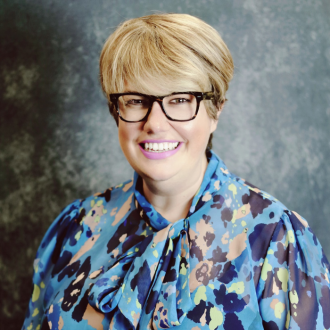- Undergraduate
Performance and Music Management with Foundation Year BMus (Hons)
Overview
Why study at the University of West London?
- Ranked 30th university in the UK - The Guardian University Guide 2025
- UWL is the second London modern university for Music, Complete University Guide 2024
- Our Music courses are ranked #2 in London for modern universities* - Guardian University Guide 2025
- Number 1 London university for overall student satisfaction - National Student Survey 2024**
- Best university for Student Experience and Teaching Quality in the UK - The Times and Sunday Times Good University Guide 2024
Are you interested in a career in the music industry? The BMus (Hons) Performance and Music Management is the perfect course if you want to take control of managing your career while gaining studio knowledge to perform basic recordings.
As such, this degree has a heavy focus on learning how the industry works and how you can empower yourself as a pragmatic, well-informed creative business entrepreneur.
The degree recognises that modern performing artists are no longer just performing artists. They require a solid – industry-focussed – managerial foundation, a high level of performing ability, a knowledge of musical concepts, and a strong creative drive.
All BMus (Hons) Performance and Music Management students will have access to digital distribution with no upfront cost for their musical endeavours during their studies to promote student-led entrepreneurship and a strong creative community via the university record label.
As part of a University-wide scholarship, students enrolling on the BA (Hons) Music Management course in the coming academic year will receive a free pair of Sennheiser headphones as well as multiple key textbooks upon enrolment.
View some of our students' recent work.
Foundation Year
The foundation year course is designed to equip you with the skills and knowledge you need to continue onto your Honours degree. You will study a range of subjects that will underpin your future study and also gain valuable experience of university life, with full access to campus facilities. Successful completion of the year allows you to progress straight onto Level 4 of this course. Please note that a £2000 Path to Success bursary is available to all UK foundation year students, which is non-repayable.

Select your desired study option, then pick a start date to see relevant course information:
Start date:
If your desired start date is not available, try selecting a different study option.
Why study Performance and Music Management with Foundation Year with us?


What our students say…
I'd describe my university experience as absolutely fantastic. The atmosphere and being around like-minded people was my favourite aspect of university life.The tutors were great.
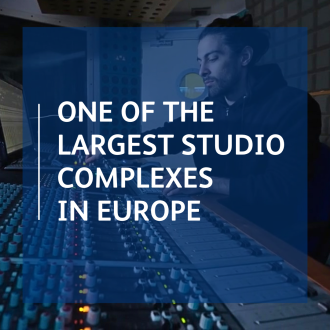
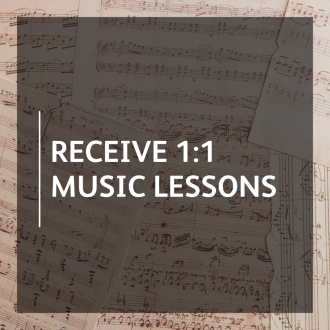
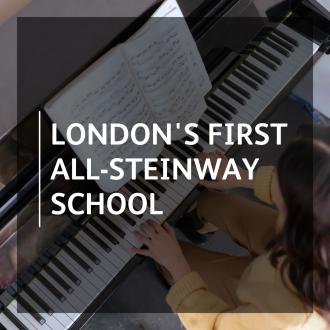
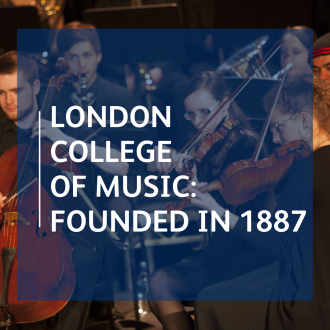
Course detail & modules
This course at the London College of Music (LCM) offers you a fantastic range of music career options, thanks to its balance of professional and practical skills development. Around half the course is focused on performance with the other half split across:
- songwriting and arrangement
- the music industry
- management and promotion
This allows you to concentrate on the areas of study you are most interested in, building your abilities and knowledge across:
- musicianship, with one-to-one tuition and workshops
- writing, composition and arranging
- stagecraft and performance
- band leadership / musical directorship
- marketing and PR
- entrepreneurship
The transferable self-management and marketing skills you will build are suitable for a wide range of music industry jobs. In addition, you will have the option to study live sound, music education or experimental sound.
There will also be exciting opportunities to perform and collaborate with other LCM artists and musicians. You will be able to form bands and ensembles, put on showcases and shows, and join recording and production sessions as a musician or producer.
In your first year, you will learn a varied repertoire in weekly music performance workshops, develop your music theory knowledge, explore composition and learn about producing music videos.
For year two, you will take things a stage further, adding to your performance repertoire and developing your understanding of the music industry.
During your third year, you will be playing showcases and other performances, and undertaking a music management project. This is alongside exploring the entrepreneurial aspect of being a performing artist.
During your studies you will have access to high-quality music facilities with an extensive complex of studios equipped to a professional specification. To find out more, see our LCM facilities.
Foundation year
There are many reasons for joining a foundation year course; you may not have the exact subjects or grades at A level to meet the entry requirements, you may have been living abroad or want to change direction with your career. Whatever your starting point, the foundation year offers a firm grounding in the skills and knowledge that you will need to get the most from your studies and thrive at University. Successful completion of the foundation year allows you to progress straight onto Level 4 of this course
Compulsory modules
-
Study Skills for Success
This module will enable you to read critically, present an argument, and distinguish between the quality and suitability of materials. It will prepare you to use and evaluate a range of evidence sources throughout your degree.
-
Sound Production Workshop
This module will provide the fundamental skills required to be successful in analogue studio-based work, exploring technique through supported practice. The module will focus on the fundamental skills of signal routing between hardware devices typical in modern studios.
-
Introduction to Performance
-
Personalised Learning
The Personalised Learning module is intended to equip you with the study skills needed to successfully progress onto level 4, the first year of undergraduate study. Tutor group sessions are an integral part of the module, where you will consolidate your learning and frame it in the context of your subject area. The module will focus on various aspects of study skills, such as those skills related to reading and writing, learning approaches, problem-solving techniques, critical thinking, researching, referencing, plagiarism, legal research and time management.
-
Performance Studies
-
Introduction to Contemporary Production Studies
Making music involves understanding how it works – the sounds and the structures – and in this module you will examine the way that others have made music and use some of those ideas to make your own productions. You will explore musical structure, rhythm, melody, harmony, instruments and how computers represent those sounds on a screen.
Compulsory modules
-
Performance for Recording
Performance for Recording will help students develop the required skills needed to perform in a studio recording environment to a high standard. The module will help students to develop the playing skills specific to the studio environment and increase student’s understanding to different recording and musical approaches. Performance for Recording runs in Semester 1 and is an introduction to the performance strand in the learning journey. It covers a comprehensive overview of contemporary studio practice and the specific concepts relevant to performing for the recording process.
The module will extend listening, playing, and organisational techniques required to operate as an effective session musician. The module is also s fun introduction to the recording studio facilities at UWL. This module is also supported by extra instrumental lessons so that students can continue to develop their musical skills in their chosen instrument.
-
Audio Principles
Recording theory is a broad module introducing a variety of topics vital to the field of music technology. It also serves as a base for the more practical and technically orientated modules in the music technology degree courses at LCM/UWL. It is a key module designed to equip students with a grounding in the core knowledge and techniques germane to the disciplinary nature of the music technology courses.
The module aims to provide the student with a solid grounding in the theory, techniques and terminology associated with contemporary acoustic and digital recording practice, as well as ensuring a fundamental grasp of the basic physics of sound and sound propagation.
-
The Management Role
The Management Role is an introductory module for level 4 students. The module provides students with the basic under-pinning, and historical grounding required to understand and navigate the UK music industry. By the end of the module students will have the knowledge necessary to begin investigation into specialised fields of advanced music management.
-
Situated Performance
After the performance for studio module, students are encouraged to explore a range of different performance styles. Situated Performance runs in Semester 2 and is designed to enhance student’s interaction with different performance environments as well as different types of audience. The module will extend listening, playing, and organisational techniques required to operate as an effective performer while considering the limitations of different performance situations. Performance for Audience will help students develop the required skills needed to perform as an ensemble no matter where they are.
-
Studio Recording
Recording Practice will help you develop the required skills needed to operate studio recording technology to a high standard. The module will further the listening skills covered in Recording Theory and will increase your sensitivity to different recording and musical contexts. It covers a comprehensive overview of contemporary studio technology and the recording process.
The module will also extend ear-training techniques and examine each component of studio technology in detail. In addition, it will address how the techniques of recording are coupled to the technology, providing each student with a backbone of knowledge designed to help the recording demands of the second year.
-
Contracts and Law
This module is a key foundation to understanding the principles and doctrines of UK Law that are commonplace in the media and music industry.
With this module, you will gain an understanding of current UK legal practices and requirements of the music and entertainment industries. This will inform you how future business ideas can develop and provide long-term income. There will be an introduction to reading typical contracts and understanding their legal standing and limitations.
Compulsory modules
-
Career Strategies
Career Strategies is a module that encourages students to evaluate and understand their potential career in the music industry. Students will attend lectures and workshops to evaluate the multiple opportunities available to them when they complete their degree. The module aims to calibrate their career goals at an early stage in their professional development. At the end of this module students will have a clear idea of how to maximise the rest of their degree to aim for a career specific to their skillsets.
-
Leading in Performance
At this point in the performance journey, students have learned to adapt to various settings and investigated their own artistic voice. Having learned these skills, the students now need to learn how to lead other musicians to achieve their artistic vision. Leading in Performance is a workshop-based module designed to assist students in achieving their musical leadership goals using a combination of group management and musical literacy skills.
This module will culminate in a scenario where students will lead a performance of two songs with only one rehearsal to prepare for the concert. The aim of this module is for students to assume leadership roles and drive a small team of musicians in an experience similar to that of a late-night TV show house band.
-
Performance Artistry
Having completed the level 4 performance subjects, students move from the practical aspects of performing in a variety of settings to the more artistic exploration of what it means to be a performer. Performance Artistry is an advanced performance subject designed to develop students' understanding of their role as a content creator and a performer. As such, the module functions in a similar manner to a record label artist development (A&R) department. This module gives performance students a deeper understanding of their relationship to the music industry.
-
Brand Development
The module will consider a variety of current approaches to visual based marketing campaigns. It will educate students in the visual aspects of social media activities, examining the various perspectives drawn from a combination of theoretical research and practical engagement.
Students will simulate the role of a digital marketer; they will plan campaigns using a mix of creative approaches suitable for the contemporary music industry. Completing this module will equip students with vital digital content creation and marketing skills applicable to the current creative marketing environment.
-
Research Methods for Music Management
This module aims to get students thinking about research: How can they understand the practices of music management on a deeper theoretical level? Students engage in the processes of collecting and analysing data and reflect on theoretical approaches to the study of the subject area. Students then conduct a review of academic literature in their field, which is relevant to their chosen topic. These activities are used to think about ways that students can improve their theoretical approaches to professional practice. Developing these research skills will form the basis for designing a major project at level 6.
-
Understanding Music Publishing
This module is designed to develop the students’ understanding of music publishing, and the surrounding infrastructure that supports this important music revenue stream. Such associated infrastructure includes, collection societies, advertising agencies, and other musical trade bodies. It will investigate their membership, their roles, and their primary function within the industry of licensing songs and recordings, as well as, distributing income to intellectual property rights holders. At the end of this module, students will have a fundamental understanding of this often-invisible income stream.
Compulsory modules
-
Performance and Management Project
The performance and management project is a self-directed module that allows students to showcase the skills and abilities developed during the previous years of study. The module spans the whole academic year and provides students with the opportunity to develop a recording and performance based on a particular stylistic interest. It is expected that the recording and performance is clearly related to the content of the course, and displays an understanding of how to record, perform, and launch music to a wider audience.
-
Performance for Audience
Performance for audience is a collaborative module that encourages students to stretch their musical boundaries and develop longer thematically connected musical performances. In this module students must generate 25-minute performances that both sustain performance energy and deliver a well curated musical experience for audiences. In this module students demonstrate a mastery of performance logistics, musical organisation, and audience engagement.
-
Digital Marketing
In this module students will take their previously acquired industry knowledge and further their skills using applied scenarios. The module is broken into two parts that will cover both theoretical underpinnings and applied learning scenarios. In the first section, students will engage with broad theoretical concepts that underpin digital marketing and will apply these to current market exemplars. The second section will focus on the demonstration of previously acquired knowledge and skill sets in an applied learning scenario. At the end of this module students will be capable of assembling teams and developing complex marketing campaigns for industry leading acts.
-
Performance for Industry
Performance for industry is the culminating performance experience where level 6 students have the opportunity to demonstrate their mastery of performance to a panel of industry experts. Students will propose and design a performance event in consultation with the module tutor that represents their aesthetic journey as an artist and performer.
-
Portfolio Development
This module focuses on the development of your portfolio career. Increasingly, the successful modern freelancer requires a diverse range of skill sets in:
- writing styles
- technique
- arrangement
- production
- the ability to expand your client base and income streams.
Workflow demands will be examined in a time managed ethos to allow best practice. The module also explores creative outlets, future facing opportunities and residual income streams to allow you to pursue a career as a music professional whilst developing your portfolio.
Entry requirements
These can include:
- A-Levels at grades B and C (if you have two A-Levels) or grades D, D and D (if you have three), or above
- BTEC Extended Diploma with Merit, Merit, Pass
- Access to HE Diploma
- T-Levels
You also need GCSE English and Maths (grade 9 – 4 / A* - C) or Level 2 equivalents.
We require you to have a minimum standard of musical ability - currently Grade 6 performance (on your stated first instrument, or voice), alongside Grade 5 Music Theory and sight-reading at Grade 5 or 6. We will audition you if you believe you meet the required standard but have no formal qualifications.
Looking for BMus (Hons) Performance and Music Management without Foundation Year?
You may be eligible for a student loan to cover the cost of tuition fees, or a maintenance loan. Additional funding is available to some types of students, such as those with dependants and disabled students.
Looking for BMus (Hons) Performance and Music Management without Foundation Year?
You need to meet our English language requirement - a minimum of IELTS 5.5 for each of the four individual components (Reading, Writing, Speaking and Listening). Visit our English language requirements page for information on other English language tests we accept.
You also need academic qualifications at the same level as UK applicants. In some countries where teaching is in English, we may accept local qualifications. Check for local equivalents.
We offer pre-sessional English language courses if you do not meet these requirements.
We require you to have a minimum standard of musical ability - currently Grade 6 performance (on your stated first instrument, or voice), alongside Grade 5 Music Theory and sight-reading at Grade 5 or 6. We will audition you if you believe you meet the required standard but have no formal qualifications.
Looking for BMus (Hons) Performance and Music Management without Foundation Year?
You may be eligible for a student loan to cover the cost of tuition fees, or a maintenance loan. Additional funding is available to some types of students, such as those with dependants and disabled students.
Looking for BMus (Hons) Performance and Music Management without Foundation Year?
Fees & funding
Please note:
- Fees for the 2026/27 academic year and onwards may be subject to Government regulation and change.
- Tuition fees are charged for each year of your course. If your course runs for two years or more, you will need to pay the fee for each academic year at the start of that year.
- If your course runs for less than two years, the cost above is for your full course and you will need to pay the full fee upfront.
- If no fee is shown above then the fees for this course are not available yet. Please check again later for updates.
Funding your studies
You may be eligible for a student loan to cover the cost of tuition fees, or a maintenance loan. Additional funding is available to some types of students, such as those with dependants and disabled students.
Foundation year bursary
If you are a UK student joining a foundation year course with UWL, you will receive a £2000 Path to Success bursary to support your studies. This is not a loan and does not need to be repaid. You will receive £500 per year subject to your attendance, engagement and progression through your studies.
To find out more, explore our Undergraduate scholarships and bursaries page.
Please note:
- Fees for the 2026/27 academic year and onwards may be subject to Government regulation and change.
- Tuition fees are charged for each year of your course. If your course runs for two years or more, you will need to pay the fee for each academic year at the start of that year.
- If your course runs for less than two years, the cost above is for your full course and you will need to pay the full fee upfront.
- If no fee is shown above then the fees for this course are not available yet. Please check again later for updates.
International students - funding your studies
We offer scholarships for international students including International Ambassador Scholarships.
Further information about funding and financial support for international students is available from the UK Council for International Student Affairs.
Teaching staff

Jez Wiles
Jez has worked with orchestra outreach departments such as LSO Discovery and City of London Sinfonia, devised creative composition workshops, frameworks and written music in partnership with schools and in healthcare settings, taught and directed samba groups on the street and at the flag handover ceremony for in the 2012 London Olympic Games and given classes at Royal College of Music, Royal Academy of Music, Trinity Laban and The Academy of Contemporary Music.
Jez has worked with orchestra outreach departments such as LSO Discovery and City of London Sinfonia, devised creative composition workshops, frameworks and written music in partnership with schools and in healthcare settings, taught and directed samba groups on the street and at the flag handover ceremony for in the 2012 London Olympic Games and given classes at Royal College of Music, Royal Academy of Music, Trinity Laban and The Academy of Contemporary Music.
Study & career progression
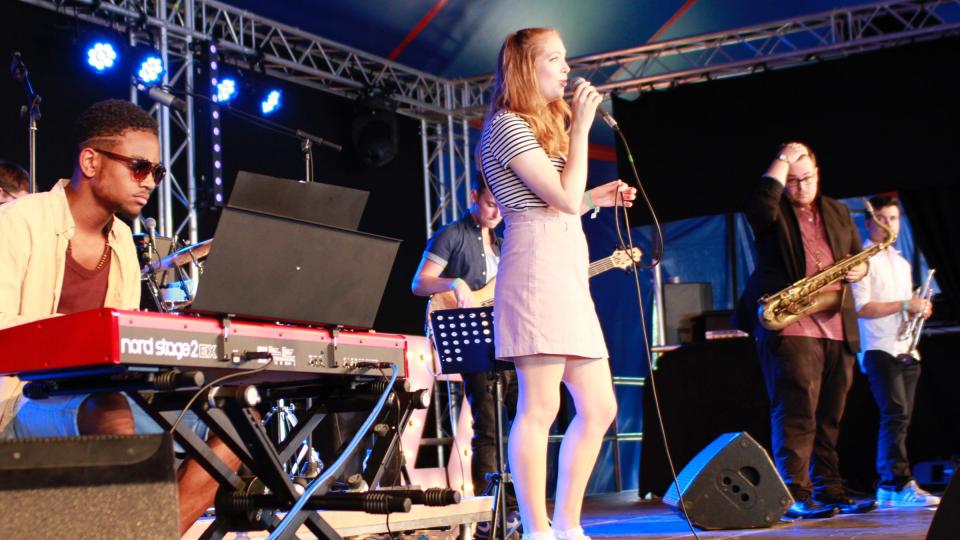
The course can open up a wide range of interesting career opportunities for you. Once you graduate you could work:
- as a recording artist
- in recording studios
- as a session musician
- on tours or cruise ships
- in schools and colleges, teaching and passing on your skills
- as a music promoter
- for record labels and music management companies
You could also advance your studies in another area of the music industry. Please see our postgraduate courses.
How to apply

Head to the UCAS website where you can apply using:
- our institution code - W05
- the UCAS course code (below)
Want to ask us a question first? We would love to hear from you. Contact us free on:
- 0800 036 8888
- courses@uwl.ac.uk
We may invite you to an audition and interview at the university. Find out more about the audition process and what happens on the day.
Apply for this course
- Institution code
- W05
- UCAS code
- currentVariantData.field_p_cv_ucas_code
Next steps after making your application
We aim to make a decision on your application as quickly as we can. If we need any more information about your qualifications, we will be in touch.
In the meantime, come and visit us and find out more about what studying at UWL is like. Sign up for an open day or join a campus tour.
Visit us and see for yourself
Talk to our tutors and find out about our courses and facilities at our next open day or join a campus tour.
Our prospectus
All of our courses in one place - download now or order a hard copy.
We're here to help
Any questions about a course or studying at UWL? We're here to help - call us on 0800 036 8888 (option 2, Monday – Friday 10am-4pm) or email us on courses@uwl.ac.uk.

You can apply to us in two ways:
- on the UCAS website – you will need our institution code (W05) and the UCAS course code (at the top of this page)
- directly on our website – follow the ‘apply now’ link below
Want to ask us a question first? Our dedicated international students’ team would love to hear from you.
- Contact the team: international@uwl.ac.uk
We may invite you to an audition and interview at the university - or online, if you aren't able to travel here. Find out more about the audition process.
Apply for this course
Next steps after making your application
We aim to make a decision on your application as quickly as we can. If we need any more information about your qualifications, we will be in touch.
In the meantime, come and visit us and find out more about what studying at UWL is like. Sign up for an open day or join a campus tour.
Visit us and see for yourself
Talk to our tutors and find out about our courses and facilities at our next open day or join a campus tour.
Our prospectus
All of our courses in one place - download now or order a hard copy.
We're here to help
Any questions about a course or studying at UWL? We're here to help - call us on 0800 036 8888 (option 2, Monday – Friday 10am-4pm) or email us on courses@uwl.ac.uk.
Search for courses
ARTSFEST

Find out more about the work our students produce and view some of their recent work by visiting our Music Performance and Composition ARTSFEST page.
Facilities
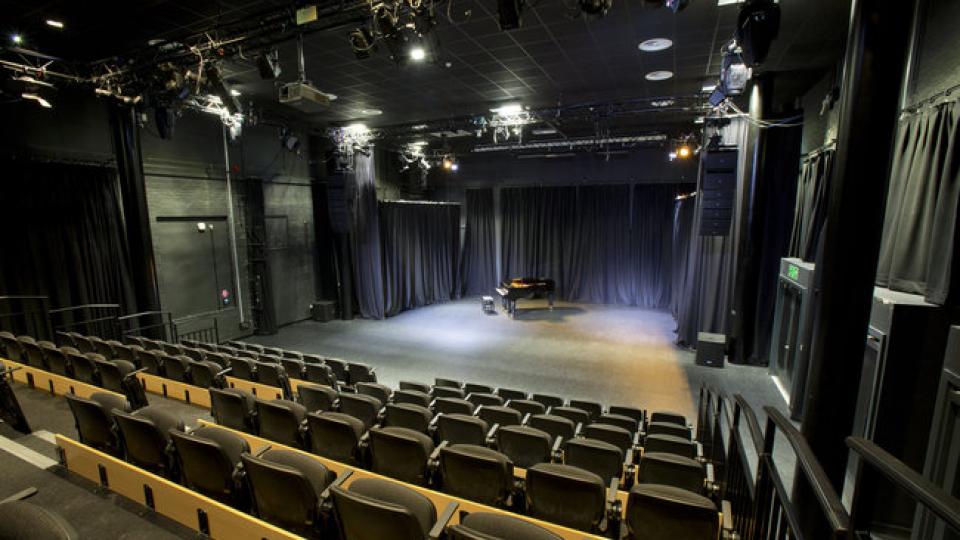
Performance spaces
Our flexible, professionally-equipped performance spaces include Lawrence Hall, a 200-seat black box studio theatre, and Vestry Hall, a classical music performance space featuring a Steinway B Concert Grand piano, concert tuned percussion and seating for up to 150
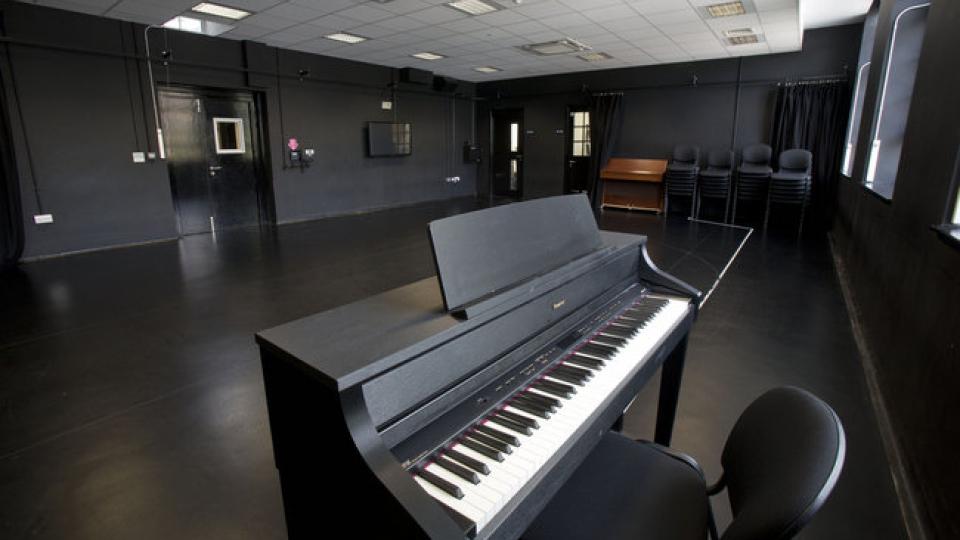
Production studios
We have four black box production rooms featuring performance dance floors, ballet barres, wall mirrors and ¾ drapes. All rooms have PA and AV support in all rooms. The digital stage pianos are by Roland.
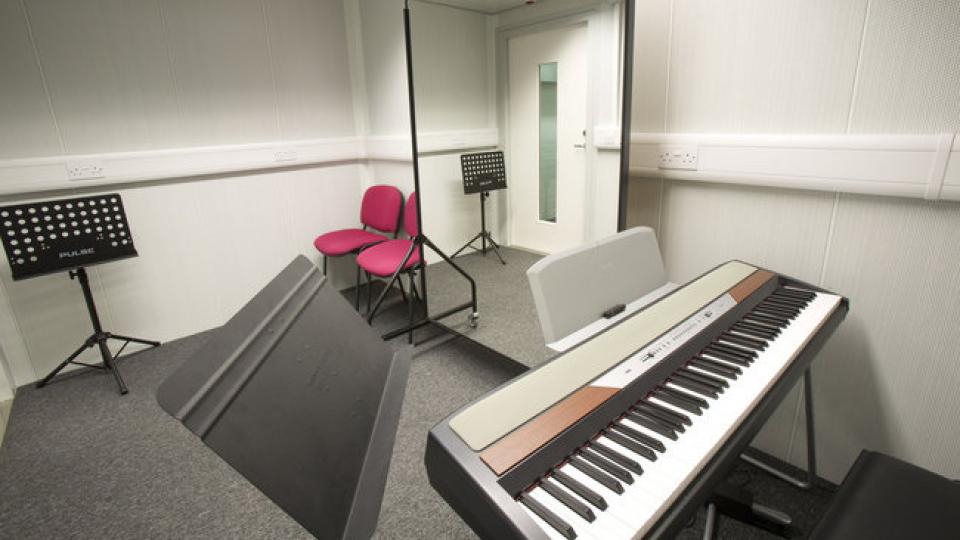
One-to-one teaching pods
We have five acoustically isolated teaching pods featuring Roland and Korg digital pianos and mirrors to facilitate one-to-one teaching in voice.
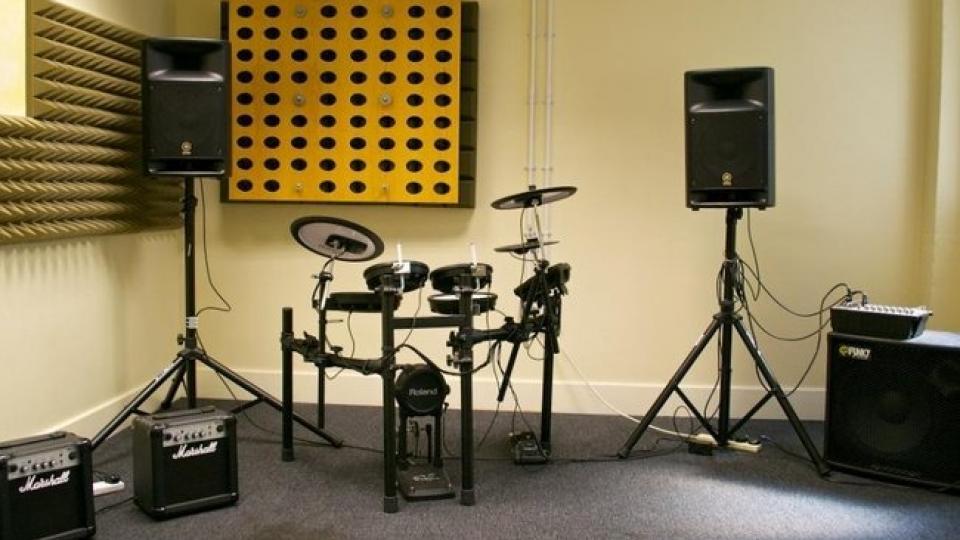
Music performance rooms
All music performance rooms feature drums and backline plus PA support.
- Drums by Roland and Pearl.
- Backline by Marshall, Orange, Line 6, Fender and Gallien-Kruger
- Stage pianos by Korg and Roland
- Synths by Roland and Kurzwiel
- PA by Yamaha, ABT and Nexo.
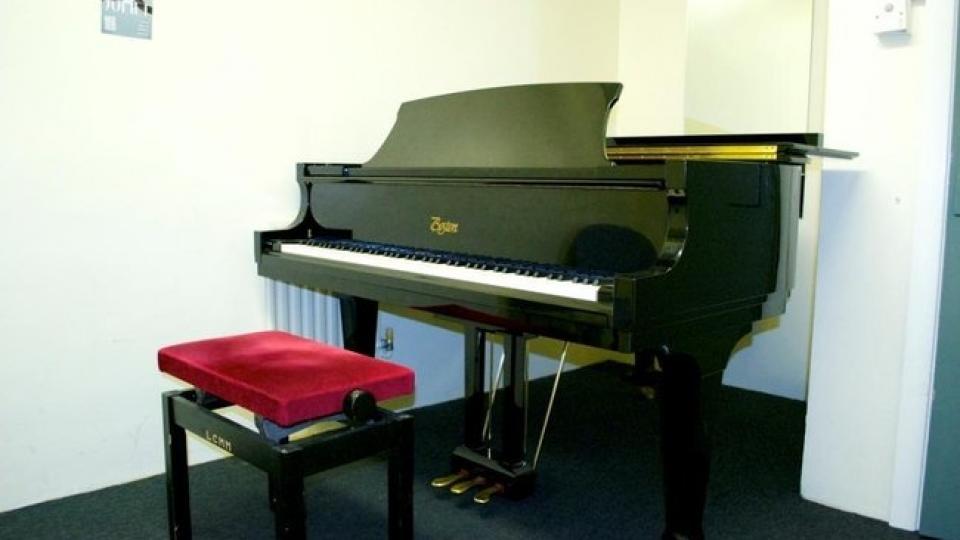
Basement practice rooms
- All LCM practice rooms benefit from LCM’s All Steinway School status to bring you the very best instruments.
- Three percussion practice and teaching rooms.
- Percussion rooms feature Pearl kits with recording and playback systems.
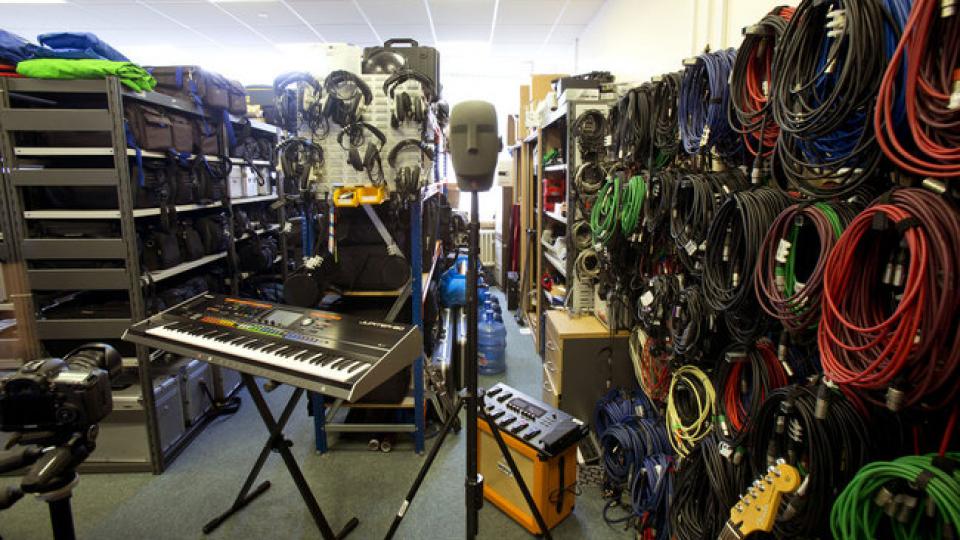
Media Resource Centre
At our Media Resource Centre (used by all subject areas) you'll find extensive portable audio recording systems, including up to 24 track digital HD recording and portable Focusrite RedNet systems.
There is also video-camera and accessory support, including LED and tungsten lighting systems, track and dolly systems and stedi-cam rigs.
Student life at UWL
Important notes for applicants
Disclaimer
*Modern universities - defined as higher education institutions that were granted university status in, and subsequent to, 1992.
**The National Student Survey 2023 and 2024 - Average of answers to all questions by registered student population. Excludes specialist institutions.
Testimonials - our students or former students provided all of our testimonials - often a student from the course but sometimes another student. For example, the testimonial often comes from another UWL student when the course is new.
Optional modules - where optional modules are offered they will run subject to staff availability and viable student numbers opting to take the module.
Videos - all videos on our course pages were accurate at the time of filming. In some cases a new Course Leader has joined the University since the video was filmed.
Availability of placements - if you choose a course with placement/internship route we would like to advise you that if a placement/internship opportunity does not arise when you are expected to undertake the placement then the University will automatically transfer you to the non-internship route, this is to ensure you are still successful in being awarded a degree.





